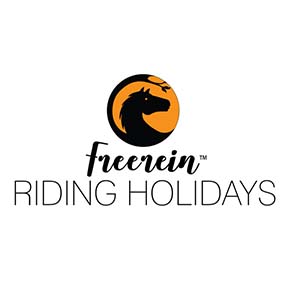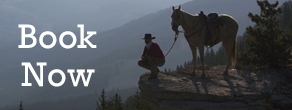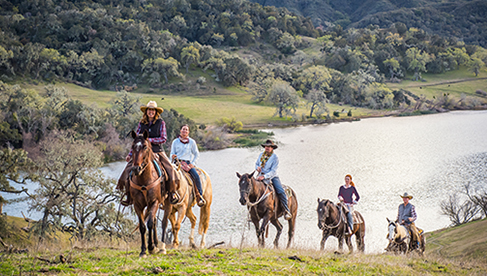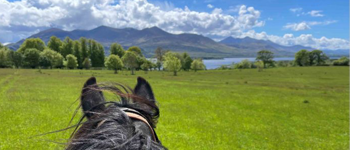Therapeutic Riding at CHAMP in Vermont
CHAMP is a therapeutic riding program located in Vermont providing riders and volunteers with an enriching and unforgettable experience.
by Jocelyn Pierce
with photos from Sarah Rosedahl
7-year-old Alex was struggling to adjust in school. Banned from the lunchroom and playground for fighting, and written up 11 times for bad behavior on the school bus, Alex’s foster mom, Diane Landry was searching for a solution. Guidance counselors suggested Alex be placed on behavior modifying drugs, which Diane was strongly against. He had already tested negative for learning disabilities and hyper activity more than once. When Diane heard about The Champlain Adaptive Mounted Program, known as CHAMP, on the local news, she decided to sign Alex up for lessons.

CHAMP is a Premier Accredited Center of PATH Intl, and all instructors are also accredited by PATH Intl., meaning they keep strict regulations to ensure "basic standards for health and safety to promote the well-being of all participants and horses" are followed.
Since 1987, CHAMP has been offering therapeutic riding for children and adults with a variety of disabilities and individual needs. CHAMP’s mission is to provide everyone involved with the ability to relate to the horses and learn about companionship, joy, and the sense of liberation that is gained from partnering with a horse.
A Premier Accredited Center of Professional Association of Therapeutic Horsemanship International, (PATH Intl.) CHAMP provides recreation, confidence, and healing for over 60 riders of all ages with physical, mental, and emotional challenges. Group and individual lessons are offered six days a week at Good Hope Farm located in South Hero, Vermont.

“Through working with CHAMP we have come to find that the impact that they have on our kids is extraordinary. It is equal parts empowering and humbling”-Jim Young, Teen Program Director at the King Street Center
Since Alex began taking lessons at CHAMP, he has undergone a dramatic change in his behavior. According to Diane, Alex has newfound confidence, increased self-esteem, and has become more physically fit. Schoolyard fights are a thing of the past for Alex, and Diane attributes this to his sessions with the horses. Handling the horses and acting calmly around them has helped Alex to “overcome nightmares, stress management, and conflict resolution.”
Legacy of Good Hope Farm
Good Hope Farm fittingly carries on the lifework of Joseph Ebenhart, who owned Good Hope Farm from 1943 to 1955. Ebenhart’s youngest son, Semond was born in 1936 with Down syndrome and Ebenhart spent much of his life striving to develop programs for those with disabilities.
According to his granddaughter, Anne Geller, Ebenhart founded the Vermont Association for Retarded Citizens and the Bennett C. Douglass School, the first school of its kind in Vermont. He was also one of the founders of the National Association for the Retarded. Upon returning to Good Hope Farm to see the land where her grandfather built his cow barn, Geller acknowledged the parallels between Ebenhart’s mission and the therapeutic program CHAMP has developed.

Former owner of Good Hope Farm, Joseph Ebenhart, spent much of his life instilling programs and activities to help the disabled. Here Ebenhart is pictured with his youngest son, Semond who had Down syndrome.
Ebenhart’s legacy lives on at Good Hope Farm as CHAMP welcomes people of all ages and abilities, and leaves a lifelong impact on many of the participants. Weekly lessons with the horses is something to look forward to and cherish.
Sara Bourbon’s cerebral palsy made it difficult for her to show interest in school. Physical education classes were dreaded, and she was unenthusiastic about reading and schoolwork. Since Sara began riding at CHAMP, “she has formed a deep emotional attachment to the horses she has met and rides,” said parents John and Nancy Bourbon. “To her, they are true friends, not just large hairy animals.”

“I can’t say enough about the CHAMP Program at Good Hope Farm. What it has done for my son and his self esteem and self control.” -Diane Landry
Horseback riding has become a channel for learning for Sara. She enjoys gym class now, as she can work on strengthening her riding muscles, and reading has become fun, as she has discovered countless horsey books.
How Therapeutic Riding is Beneficial
Mary Willmuth has been involved with CHAMP for 20 years. She is currently President of the Board of Directors and is also a therapeutic instructor. Willmuth explains lessons are customized based on the individual rider’s capabilities, focusing on fundamental riding skills. Volunteers make lessons fun and engaging by playing games on horseback, and by asking riders to complete specific tasks, such as weaving through cones, picking up and placing objects, or riding through an obstacle course.
.jpg)
“The Maryannes” pose with their ribbons at Good Hope Farm.
Horses help riders with disabilities in a number of ways. Physically, emotionally, and cognitively, horses offer support, guidance, and inspiration. Willmuth explains the horses are legs for riders who struggle with immobility, allowing them to be in control of where they are going and to feel the power of the animal. The horse’s gait mimics walking, helping to improve muscle strength, balance, and also stimulates nerve endings, helping to promote cognitive growth and brain development.
Horses provide participants with fun and enjoyment, becoming special friends to riders as they build a relationship and bond with their mounts. Riders control a large and powerful animal, building confidence along the way. Social skills are improved as participants interact with horses, volunteers, and each other.

Laura Howland from the King Street Center, a local organization that partners with CHAMP, immediately saw the value of CHAMP reflected in the children. “After only a few lessons I realized that horseback riding could provide so much more to a child’s development,” said Howland. “When a child develops a connection with a horse they put away the fears and anxiety of being a teen and it is replaced with composure and strength.”
Many activities in CHAMP’s lessons help with focus, following directions, and general cognitive skills. Participants are able to take what they learn from therapeutic riding and apply it to everyday life and tasks.

“The times that I’ve been at the farm is a time I’ll never forget for the rest of my life. Thank you to all the people that got me where I am today”-CHAMP participant
Like Howland, Alisa Anderson, Program Director of Smuggler’s Notch Adaptive Program (SNAP) was amazed by the changes she saw in their campers. “Many campers are more verbally engaged during the lessons than during any other activity,” said Anderson. “We have experienced campers with autism become focused and calm while on the horses. For some of our campers who are physically disabled, they find physical comfort from the movement of the horse. Some campers are fearful of the experience and find a sense of accomplishment by overcoming their fears.”
What is truly amazing is that riders with differing needs, from all spectrums, benefit from this program, accomplishing tasks that may have seemed impossible.
Help Support CHAMP
CHAMP is almost entirely volunteer run, working to ensure horses and riding are available to people who might not otherwise have the opportunity to enjoy them. Horse people understand the bond between horse and rider like no one else can and what that partnership does for the individual’s psyche.

Riders leave from Good Hope Farm at CHAMP’s 17th Annual Benefit Trail Ride, which took place on September 14, 2013. All proceeds from participants benefit CHAMP’s therapeutic program.
CHAMP always needs horsey volunteers; grooms to groom and tack up, side walkers and leaders, and general barn help. However, volunteers don’t necessarily have to work directly with horses or riders. CHAMP also needs help with administrative duties, data entry, maintenance, gardening, and mowing.
2013 marked CHAMP’s 17th annual benefit trail ride, which was a huge success. The ride is 16 miles round trip and leaves from Good Hope Farm. Riders also have the option of a shorter, two-hour ride. Consider participating in 2014’s trail ride in September. You can take in the beautiful Vermont countryside in the autumn, while supporting a great cause.

The 16 mile round trip benefit trail ride covers ground in beautiful Vermont countryside, with lunch on the beach. Consider signing up for 2014’s benefit ride to help contribute to CHAMP.
How to help: Willmuth encourages people to visit CHAMP, and to bring riders along to participate. While CHAMP always needs volunteers, if you are unable to volunteer your time at CHAMP, they also welcome donations of horse equipment and tax-deductible monetary donations. Donate to CHAMP.
About the Author: Jocelyn Pierce is an avid equestrian and lover of travel and photography. Her passion for adventure has led her on numerous excursions throughout North America and Europe. When she’s not riding and competing her homebred mare, she enjoys hiking, camping, and snapping photographs.




